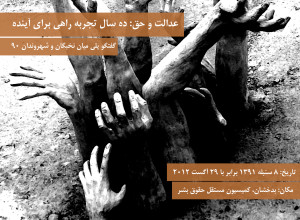The 90th Goftegu public debate (6th year), a bridge between the elite and the citizens, of Armanshahr Foundation, entitled “Justice & rights: 10-year experience; a way for the future” was organised in Fayzabad, provincial capital of Badakhshan, at the hall of Afghanistan Independent Human Rights Commission on 29 August 2012. Human rights and civil society activists, women’s rights activists and many young people attended the meeting to hear discussions based on human rights, victims and justice.
The meeting started with the screening of the film ‘Eyewitness’ produced by Armanshahr Foundation and directed by Mr Rafii Behrouzian and Ms Elka Sadat. Later, Mr Jawad Darwaziyan presented a speech with the title of ‘Universal Jurisdiction: A mechanism to pursue violators of human rights,’ covering topics such as the definition of the UJ, its history, its relationship to human rights conventions, covenants and other related instruments, its achievements, challenges and solutions.
One of the speakers was Ms Maryam Amvaj, director of the Women for Women institution who discussed justice based on the problems of women in Badakhshan: “The last 10 years, despite the shortcomings, were full of promises especially for women.
“In the first few years, we witnessed the development of education for women and their liberation from captivity, bias and extremism. Their status rose after the passage of the new Constitution, which emphasised the equality of men and women and protection of the family, and banned discrimination. Other achievements included the establishment of the Ministry of Women’s Affairs, the Afghanistan Independent Human Rights Commission, women’s active presence in the government and the parliament and the passage of the Law for Prohibition of Violence against Women. Women of Badakhshan also benefited from those developments and made progress in education, work and basic rights. It is unfortunate that disorder and regression as well as atrocities such as assassinations, violence, stoning, customary informal courts, poisoning of female students, burning the girls’ schools, reduction of women’s role in the parliament and the cabinet have led to decrease in women’s share.”
On the specific problems of women in Badakhshan, she said: “The improper conditions in Badakhshan have made it difficult for women to have access to health facilities and, despite the great interest of girls in education, they are deprived owing to lack of female teachers. The traditional culture prevailing in our society has influenced all aspects of life. That culture, which is inundated with discrimination against women, has always prevented them from achieving their basic rights.”
In her opinion, such factors as the low level of literacy, poverty, lack of security and absence of the rule of law bring the greatest harms to women. Even though the passage of the Law for Prohibition of Violence against Women has raised new hopes for implementation of justice, it has not yet taken a practical form. Women of Badakhshan suffer from violence in the family. Obstacles such as the prevailing traditions, women’s economic dependence on men, and their emotional attachment to their childrenhave always prevented women from objecting to men’s violence in the family. Nevertheless, they have been raising their voice lately to achieve liberation.
She expressed also a tone of optimism: “Those instances may indicate a rise in violence against women, but women have found an audience to reach their voice. Girls do not wish to live in an unwanted marriage and suffer for a life time.”
She criticised the justice and judicial institutions: “Women still face problems with having access to justice institutions. The corruption that prevails over the government, failure to implement the laws, and influence of patriarchal ideas on all judicial organisations pose serious challenges to women’s quest for justice. Thus, if young girls dare to avoid forced marriage, they must endeavour for a long time to achieve their basic right of choosing a spouse. The traditional issues of engagement and marriage are still obstacles. Young girls are married traditionally by their families and when they refuse, they have to face dangerous consequences, to be punished and spend a long time behind bars. In many moral instances, girls are punished but boys are not questioned at all. Even in cases of adultery, only girls are punished, but men get away somehow.
“A long time is needed to combat injustice, because social change cannot be achieved overnight. Civil, human rights and women’s institutions play an important role in protecting the values.”
Subsequently, participants of the meeting voiced their criticisms, suggestions and opinions for improvement of the conditions of civil institutions and the media in Badakhshan. Most of them complained of the failure of government bodies to implement the laws, bullying of the strongmen, economic problems and emergence of fundamentalism.
Mr Samiollah Sayhoun, a Badakhshan journalist, was of the opinion that emergence of the Taleban in Badakhshan was the result of lack of seriousness on the part of the government to uproot them. He said: The strongmen are so powerful in every aspect that journalists have to engage in self-censorship and not disclose the truth.
Some participants were of the opinion that the civil society has not taken shape in Badakhshan yet.
Some publications of Armanshahr Foundation were distributed among the participants.
To view the publications related to this Goftegu Public Debate, please refer to the following links:
حقوق بشر بر سر دوراهی: ضرورتِ رهیافتِ حقوق محور به صلح و مصالحه در افغانستان
Invitation to 90th Goftegu Public Debate: Justice and Rights; Ten Years experience and the roadmap



